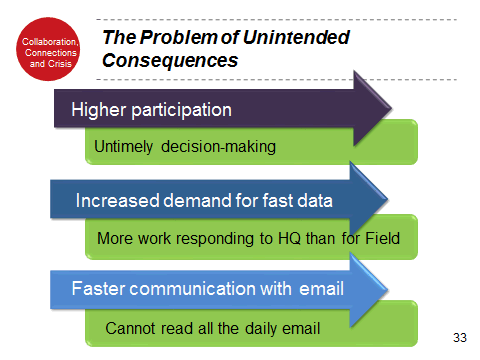The unintended consequences of good intentions: over-participation and decision paralysis burns up people and time; impossible to be agile. See #89, One more time: What is Bureaucracy?
unintended consequences, "a negative or a perverse effect, which is the opposite result of what is intended" --http://en.wikipedia.org/wiki/Unintended_consequences
"In medicine, most drugs have unintended consequences associated with their use, which are known as 'side effects'." --http://en.wikipedia.org/wiki/Unintended_consequences#The_Law_of_Unintended_Consequences
See Paul Farmer's quote "It taught me a lot about what sociologists call the unanticipated consequences of social action." here: http://www.lessonsfromhaiti.org/press-and-media/transcripts/accompaniment-as-policy/
and his footnote: "See Merton R. The Unanticipated Consequences of Purposive Social Action, American Sociological Review 1, no. 6 (1936): 894-904."
"In the twentieth century, sociologist Robert K. Merton once again popularized the concept, sometimes referred to as the Law of Unforeseen Consequences. Merton (1936) spoke of the "unanticipated consequences" of "purposive social action", emphasizing that his term "purposive action… [is exclusively] concerned with 'conduct' as distinct from 'behavior.' That is, with action that involves motives and consequently a choice between various alternatives" (p.895)." --http://en.wikipedia.org/wiki/Unintended_consequences#The_Law_of_Unintended_Consequences
From "Crisis, Connections and Collaboration," Penn State, October 17, 2011
Penn State\2011\Collaboration, Computers and Crisis v3 .pptx

From "Two kinds of Two Kinds of Social Media," DIHAD paper, May 3, 2011 [this is still a very good, relevant paper] Work\2011\Two Kinds of Two Kinds of Social Media - DIHAD v3.docx
"These examples are a reminder that technology is a useful tool, but the intentions of the users gives it its quality. In this sense, there is no such thing as “good” technology.
The Problem of Unintended Consequences
Perhaps a footnote in this paradigm is the adage that even the best intentions can go astray. When a disaster occurs, people of compassion want to know what they can do to help. Some give money, some time and others lend their talents. The technology community is no exception. With the proliferation of free tools and a virtual community, it is possible for IT savvy people to help without leaving their desks.
As one would expect, a key message of the DIHAD 2011 conference is that we all believe in the potential of technology applied to disaster response. And there has been an explosion of technology and data over the past few years. Now we are hearing the message that we are drowning in data and need help sorting it out. It is as if the cry from those on the front lines is “don’t give us something we can’t use!” It has led some to question whether the information that is being so readily provided on crowd-sourced maps, burgeoning text messages, and ubiquitous email is actionable: can we discern the most important information and act on it? [ See Paul Currion’s thought-provoking article “If all You Have is a Hammer - How Useful is Humanitarian Crowdsourcing?”, Oct 20, 2010, http://www.mobileactive.org/how-useful-humanitarian-crowdsourcing ] In the world of growing information, we need to be able to separate the interesting from the useful. This may be a noble assignment for our crowd-sourcing colleagues to undertake.
Cracking The Walnut.
https://www.youtube.com/watch?v=uR7gIdATgDU
It became a TV show: https://lockerdome.com/6945235217430081/7146963992973897
What’s going on in this story?
- The obvious: You gotta have goals and opportunity
- All the process, planning and measurements don't get you to your results; playing the game does
- First tries usually don't work; but there are opportunities for adjustment (The value of pilots, and ant-like industriousness)
- The try-try-again team approach produces learning; it may also produce results. (Don't forget one for the other.)
- Setting your sights higher sometimes produces something closer to the outcome intended
- Even in success, there are usually unintended consequences; life, like worms, is what happens when you're making other plans.
|